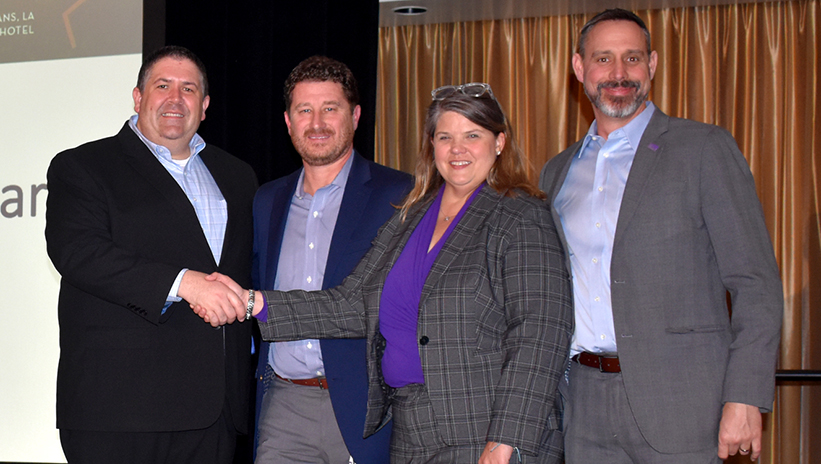Committed to the First Amendment and OUR Freedom of Speech since 2008
Simply the Best
Publisher's note: The author of this post, Matt Smith, is a contributor to ECU News Services.

East Carolina University's student entrepreneurship program, RISE29, was honored for its co-curricular innovation by the United States Association for Small Business and Entrepreneurship (USASBE) at its annual conference Monday in New Orleans.
RISE29 received the association's Excellence in Co-Curricular Innovation Award, presented annually to the college or university whose entrepreneurship program encourages creativity, quality and sustainability, and produces an impact on the communities it serves.
In its first year, RISE29 earned top honors over a field that included the country's No. 1 ranked entrepreneurship program by U.S. News & World Report.
Mike Harris, director of ECU's Miller School of Entrepreneurship, and Sharon Paynter, assistant vice chancellor for economic and community engagement, co-led the program during its inaugural year.
"When we first had the idea for the program, we knew we wanted RISE29 to become a national model for rural entrepreneurship," Harris said. "We're excited that other entrepreneurship educators from across the country saw the same potential in the program that we did. They have faith that RISE29 will serve as a blueprint to foster economic success in rural regions not only in North Carolina, but across the country."
Spurred by population loss, declining employment opportunities, and "brain drain" in eastern North Carolina, RISE29 began in February 2019 as part of a $1 million grant from the Golden LEAF Foundation. Led by the Miller School of Entrepreneurship and the Division of Research, Economic Development and Engagement, the program became the first university-wide initiative targeted at transforming students into emerging entrepreneurs.
The program works hand-in-hand with local community leaders to identify community needs and pairs business clients with students to address those concerns. As a result, students that participate in RISE29 create new opportunities and sustain existing businesses in rural North Carolina that add value and complement existing ventures in the university's 29-county service area.
During its first year, RISE29 recorded more than 18,000 hours of fieldwork with 36 business clients in Beaufort, Hyde, Martin and Pitt counties. In total, more than 140 students with backgrounds ranging from nutritionists and biologists to engineers and marketers participated in the program.
"Taking a step outside of the classroom, the students involved in RISE29 are using their skills to directly impact local businesses in Beaufort County," Beaufort County Economic Development Director Martyn Johnson said. "ECU has a strong history and a proven model of supporting rural eastern North Carolina through student involvement ... and is furthering the growth of community support between all the counties participating in the program."
RISE29 leaders plan to expand the program to more counties in 2020, eventually servicing all 29 counties that help make up its name.
"We couldn't do this without the support of our clients and community partners," said Sharon Paynter, assistant vice chancellor for economic and community engagement. "ECU has resources, including students, research facilities and collaborative innovation spaces. With the added expertise provided by business owners and county managers, we've been able to successfully jump-start a program that will have a positive benefit in developing eastern North Carolina's economy for years to come."
RISE29 is part of a growing effort to advance entrepreneurship across ECU's campus. In 2015, the university established the Miller School of Entrepreneurship and last year announced a new undergraduate degree in entrepreneurship. The university has also developed the annual Pirate Entrepreneurship Challenge and its residential, entrepreneurship-based Horizons Living Learning Community.
"When we first had the idea for the program, we knew we wanted RISE29 to become a national model for rural entrepreneurship. We’re excited that other entrepreneurship educators from across the country saw the same potential in the program that we did. They have faith that RISE29 will serve as a blueprint to foster economic success in rural regions not only in North Carolina, but across the country."
Go Back

United States Association of Small Business and Entrepreneurship President Eric Liguori, left, congratulates the RISE29 team of Mike Harris, Sharon Paynter and Dennis Barber during an award ceremony at the association’s annual conference. RISE29, East Carolina University’s student entrepreneurship program, received USASBE’s Excellence in Co-Curricular Innovation Award for the program’s novel approach to rural entrepreneurship. | Photo: Mike Harris
East Carolina University's student entrepreneurship program, RISE29, was honored for its co-curricular innovation by the United States Association for Small Business and Entrepreneurship (USASBE) at its annual conference Monday in New Orleans.
RISE29 received the association's Excellence in Co-Curricular Innovation Award, presented annually to the college or university whose entrepreneurship program encourages creativity, quality and sustainability, and produces an impact on the communities it serves.
Mike Harris, director of ECU's Miller School of Entrepreneurship, and Sharon Paynter, assistant vice chancellor for economic and community engagement, co-led the program during its inaugural year.
"When we first had the idea for the program, we knew we wanted RISE29 to become a national model for rural entrepreneurship," Harris said. "We're excited that other entrepreneurship educators from across the country saw the same potential in the program that we did. They have faith that RISE29 will serve as a blueprint to foster economic success in rural regions not only in North Carolina, but across the country."
Spurred by population loss, declining employment opportunities, and "brain drain" in eastern North Carolina, RISE29 began in February 2019 as part of a $1 million grant from the Golden LEAF Foundation. Led by the Miller School of Entrepreneurship and the Division of Research, Economic Development and Engagement, the program became the first university-wide initiative targeted at transforming students into emerging entrepreneurs.
The program works hand-in-hand with local community leaders to identify community needs and pairs business clients with students to address those concerns. As a result, students that participate in RISE29 create new opportunities and sustain existing businesses in rural North Carolina that add value and complement existing ventures in the university's 29-county service area.
During its first year, RISE29 recorded more than 18,000 hours of fieldwork with 36 business clients in Beaufort, Hyde, Martin and Pitt counties. In total, more than 140 students with backgrounds ranging from nutritionists and biologists to engineers and marketers participated in the program.
"Taking a step outside of the classroom, the students involved in RISE29 are using their skills to directly impact local businesses in Beaufort County," Beaufort County Economic Development Director Martyn Johnson said. "ECU has a strong history and a proven model of supporting rural eastern North Carolina through student involvement ... and is furthering the growth of community support between all the counties participating in the program."
RISE29 leaders plan to expand the program to more counties in 2020, eventually servicing all 29 counties that help make up its name.
"We couldn't do this without the support of our clients and community partners," said Sharon Paynter, assistant vice chancellor for economic and community engagement. "ECU has resources, including students, research facilities and collaborative innovation spaces. With the added expertise provided by business owners and county managers, we've been able to successfully jump-start a program that will have a positive benefit in developing eastern North Carolina's economy for years to come."
RISE29 is part of a growing effort to advance entrepreneurship across ECU's campus. In 2015, the university established the Miller School of Entrepreneurship and last year announced a new undergraduate degree in entrepreneurship. The university has also developed the annual Pirate Entrepreneurship Challenge and its residential, entrepreneurship-based Horizons Living Learning Community.
— Mike Harris, director of ECU's Miller School of Entrepreneurship
| Year One | East Carolina University, School News, The Region, Neighboring Counties | Molly's Community Cafe and Purple Blossom Yoga Studio Celebrate Joint Ribbon Cutting |
Latest Neighboring Counties
|
Republicans Bokhari and Driggs retain seats on city council.
Published: Tuesday, March 26th, 2024 @ 12:50 am
By: Carolina Journal
|
|
Members of the North Carolina Rural Health Association (NCRHA) visited Washington, D.C., on Feb. 14, 2024, to meet with elected officials and advocate for policies to improve access to care in rural areas.
Published: Wednesday, February 28th, 2024 @ 12:51 am
By: Eastern NC NOW Staff
|
|
The US Supreme Court will not take the case of Virginia-based owners of a Dare County beach home who challenged the county's COVID-related shutdown in 2020.
Published: Tuesday, February 6th, 2024 @ 10:14 pm
By: Carolina Journal
|
|
The North Carolina State Fair is set for the Raleigh state fairgrounds from October 12-22, 2023
Published: Friday, February 2nd, 2024 @ 9:01 am
By: Carolina Journal
|
|
A $2.5-billion-dollar bond referendum is slated to be placed on the November ballot this year, as Charlotte-Mecklenburg Schools (CMS) looks for support to fund 30 different projects in the school district.
Published: Sunday, January 14th, 2024 @ 10:08 am
By: Carolina Journal
|
|
Five Asheville-area residents are suing the city in federal court for refusing to appoint them to the local Human Relations Commission. The residents claim they were rejected because they are white.
Published: Saturday, December 9th, 2023 @ 11:53 am
By: Carolina Journal
|
|
Federal grant expands midwifery care for North Carolina
Published: Wednesday, November 29th, 2023 @ 2:59 pm
By: ECU News Services
|
|
Pirates achieve historic sponsored activities funding
Published: Tuesday, November 28th, 2023 @ 10:03 am
By: ECU News Services
|
|
Innovative new MBA pathway provides leadership experiences for students, companies
Published: Saturday, November 18th, 2023 @ 10:42 am
By: ECU News Services
|






















